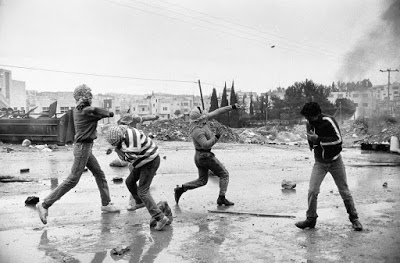Between hopefulness and despondency (and nostalgia for the First Intifada)
 |
| Nadia Naser-Najjab – December 22, 2018 |
As tension escalates in the colonised Occupied Palestinian Territories, I find it difficult to explain what I make of the current situation.
I use the term ‘colonised’ deliberately here because I feel that ‘occupation’ does not do justice to the reality that Israel is creating. And just like any other settler colonial context, there is resistance. The colonizer seeks to find any way to obstruct this resistance, and the adoption of the appearance of normalcy is just one way in which it seeks to do this, even as it in turn seeks to disrupt the normalcy of everyday Palestinian life
Palestinian resistance has been evidenced since the 1917 Balfour Declaration, and the colonisation of Palestine is a contemporary process that continues with the support of Western powers. Those political changes they have introduced have never benefited Palestinian rights. This is despite the fact that the settler colonial enterprise has affected all Palestinians, who have in turn come to lack their own sense of identity, instead being recategorized as ‘refugees’, ‘citizens of Israel’ and residents of the West Bank and the Gaza Strip’.
After the 1967 war, Palestinians were divided further. Some became refugees for a second time and more categories were also superimposed. Palestinians in Jerusalem became permanent residents, and coloured ID cards and car plates were introduced to identify those from cities, villages, the north and south of the OPT and so on. It was military administration, but Israel used the ‘civil administration’, with the intention of preparing Palestinians for an autonomy that fell some way short of sovereignty. This mentality persisted even when Palestinians compromised their full rights and accepted the two-state solution, with even this substantial concession failing to stop the continued colonisation of Palestinian land.
This concession followed on from a Palestinian uprising that had clearly indicated the limits of Israeli colonial power. The First Intifada was an event of huge significance in the Palestinian struggle, and even Palestinians who were too young to witness it currently express nostalgia for it. This is not just because the uprising embodied features that are currently lacking – popular involvement in the revolutionary struggle and a unified leadership – but also because it represented hope. Activists of the First Intifada, including me, believed that we would succeed in achieving our national rights. Our leadership was aligned with our demands and suffered alongside us. There was no elite class benefiting from the colonial power. There were no privileged groups as Israel’s repressive measures did not differentiate or distinguish. I remember one time, during the First Intifada, when the Israeli army imposed a curfew on my village and asked all men to gather in the school courtyard. No one was excluded: doctors, teachers, workers, and the unemployed were held there for hours and subject to verbal and physical abuse. The soldiers deliberately humiliated everyone by asking them to perform silly acts and chant nonsensical slogans.
But Israel came to realise that the force it used would not stop the Intifada, and it instead deployed a peace agreement, with the intention of achieving its ends. When Palestinians in the OPT learnt about the Oslo agreement, we supported it because we trusted the PLO, which was our sole legitimate representative. We even celebrated the Oslo agreement in the expectation that our dream of an independent state would be realized. When Israel recognized the PLO, we anticipated a viable state with East Jerusalem as its capital, the dismantling of Israeli settlements and the return of Palestinian refugees. This was a mirage that we either failed to see or chose not to. We had even been warned in advance when the Intifada’s leadership rejected the US autonomy proposal on the grounds that it would not end the occupation or produce self-determination.
This reluctance to accept bad terms was grounded in an unrelenting struggle against the colonialism that Palestinians continue to fight against today: the systematic humiliation and daily reality of persecution, harassment and aggression embodied in arrests, house demolition and land confiscations. Despite our ongoing resistance, the land continues to be occupied and Israeli settlements steadily expand.
After the Oslo Agreement, Israel’s colonial intentions were reiterated and rendered in stark perspective by closures, land fragmentation, permit systems and the construction of a ‘separation wall’ that divided Palestinian families and communities. In creating the Palestinian Authority (PA), the Agreement offered additional innovations in control, including a VIP system, security forces and security coordination. The PA’s dependence on international funding has also been exploited to produce conditions that benefit Israel. PA officials have become a distinct class who are detached from the consciousness of the masses still living under colonial rule. Accordingly, security coordination has become a ‘sacred’ obligation for Palestinian President Mahmoud Abbas. This is how Palestinian security forces have come to suppress Palestinian resistance while invoking the pretext of fighting ‘terrorism’, thereby echoing the discourse of their Israeli patrons. This is just one example of how Israel has used ‘divide and rule’ tactics. During the First Intifada, we did not anticipate a development in which the leadership would be co-opted by Israel and would cooperate with the coloniser against it own people. Perhaps this would have been different if we had read Frantz Fanon more closely, and in particular his discussion of the national leadership caught between reconciling with colonialism and fighting it. Antonio Gramsci’s treatment of the ‘contradictory consciousness’ of the national leadership would have yielded equal insight in this respect.
In contrast to the situation that prevailed during the First Intifada, when we were sustained by a unified leadership rooted within the needs and aspirations of the collective, Palestinians must now learn the lesson that is embodied within so-called ‘security cooperation’. Ultimately, hope will only arise in a leadership that is predisposed to challenge colonialism rather than to come to terms with it.


